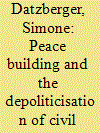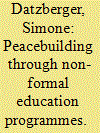| Srl | Item |
| 1 |
ID:
140971


|
|
|
|
|
| Summary/Abstract |
Over the past two decades there has been a rapid increase in funds for local civil society actors in fragile states. Current peace-building and development efforts strive for the recreation of a vibrant, active and ‘liberal’ civil society. In the case of Sierra Leone, paradoxically, this growing support has not strengthened civil society actors based on that liberal idea(l). Instead of experiencing enhanced proactive participation stemming from the civil sphere, Sierra Leone’s civil society appears to be largely depoliticised. Drawing on empirical data gathered over the past four years, this article offers three interrelated causal explanations of why this phenomenon occurred during the country’s peace-building phase from 2002 to 2013. First, Sierra Leone’s civil society landscape has become instrumentalised to serve a broader liberal peace-building and development agenda in several ways. Second, Western idea(l)s of participatory approaches and democracy are repeatedly challenged by the legacies of colonial rule and socially entrenched forms of neo-patrimonialism. Third, abject poverty and the lack of education affect activism and agency from below.
|
|
|
|
|
|
|
|
|
|
|
|
|
|
|
|
| 2 |
ID:
151535


|
|
|
|
|
| Summary/Abstract |
Experts increasingly refer to the crucial role of education in cultivating processes of sustainable peacebuilding in conflict-affected environments. While peacebuilding interventions have slowly started to place emphasis on aspects of equality or service delivery in formal education systems, the potential of non-formal education (NFE) programmes to foster social transformation in conflict-affected environments often remains unexploited. There is little research examining how NFE can affect the security situation and peace process in a conflict-affected region, or the role it plays in peacebuilding at large. To address these questions, the article draws on the case study of the Alternative Basic Education Karamoja (ABEK) programme in Uganda. It is based on a multi-track data collection strategy involving visits to learning centres, focus group discussions and interviews with government officials, teachers, youth, civil society organizations and other stakeholders over a period of three months in 2015. The study finds that, despite persistent implementation challenges, ABEK proved to (a) be relevant to the security and conflict conditions in the region; and (b) overcome structural and indirect forms of violence through alternative and flexible modes of education. The ABEK case therefore gives rise to much wider peacebuilding implications and formal education sector planning in conflict-affected environments.
|
|
|
|
|
|
|
|
|
|
|
|
|
|
|
|